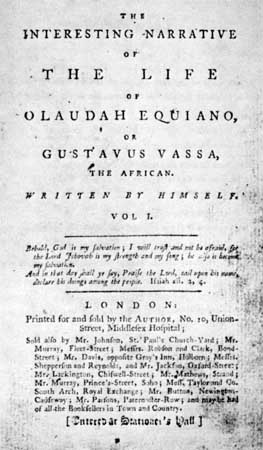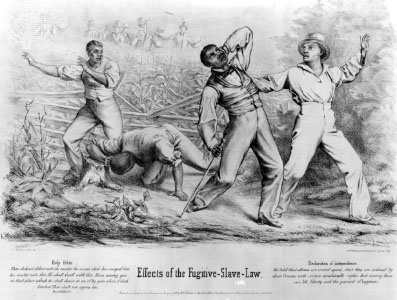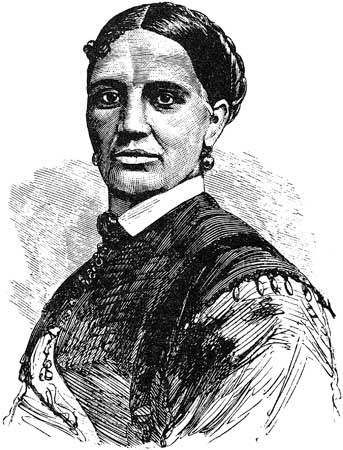slave narrative
American literature
an account of the life, or a major portion of the life, of a fugitive or former slave, either written or orally related by the slave personally. Slave narratives comprise one of the most influential traditions in American literature, shaping the form and themes of some of the most celebrated and controversial writing, both in fiction and in autobiography, in the history of the United States. The vast majority of American slave narratives were authored by African Americans, but African-born Muslims who wrote in Arabic, the Cuban poet Juan Francisco Manzano, and a handful of white American sailors taken captive by North African pirates also penned narratives of their enslavement during the 19th century. From 1760 to the end of the Civil War (American Civil War) in the United States, approximately 100 autobiographies of fugitive or former slaves appeared. After slavery was abolished in the United States in 1865, at least 50 former slaves wrote or dictated book-length accounts of their lives. During the Great Depression of the 1930s, the WPA Federal Writers' Project gathered oral personal histories from 2,500 former slaves, whose testimony eventually filled 40 volumes.
 The first slave narrative to become an international best-seller was the two-volume Interesting Narrative of the Life of Olaudah Equiano; or, Gustavus Vassa, the African, Written by Himself (1789), which traces Equiano (Equiano, Olaudah)'s career from boyhood in West Africa, through the dreadful transatlantic Middle Passage, to eventual freedom and economic success as a British citizen. Introducing the slave ship through the innocent perspective of an African captive, he wrote:The first object which saluted my eyes when I arrived on the coast was the sea, and a slave ship, which was then riding at anchor, and waiting for its cargo. These filled me with astonishment, which was soon converted into terror when I was carried on board. I was immediately handled and tossed up to see if I were sound by some of the crew; and I was now persuaded that I had gotten into a world of bad spirits, and that they were going to kill me.…When I looked around the ship too and saw a large furnace or copper boiling, and a multitude of black people of every description chained together, every one of their countenances expressing dejection and sorrow, I no longer doubted of my fate; and, quite overpowered with horror and anguish, I fell motionless on the deck and fainted. When I recovered a little I found some black people about me.…I asked them if we were not to be eaten by those white men with horrible looks, red faces, and loose hair.
The first slave narrative to become an international best-seller was the two-volume Interesting Narrative of the Life of Olaudah Equiano; or, Gustavus Vassa, the African, Written by Himself (1789), which traces Equiano (Equiano, Olaudah)'s career from boyhood in West Africa, through the dreadful transatlantic Middle Passage, to eventual freedom and economic success as a British citizen. Introducing the slave ship through the innocent perspective of an African captive, he wrote:The first object which saluted my eyes when I arrived on the coast was the sea, and a slave ship, which was then riding at anchor, and waiting for its cargo. These filled me with astonishment, which was soon converted into terror when I was carried on board. I was immediately handled and tossed up to see if I were sound by some of the crew; and I was now persuaded that I had gotten into a world of bad spirits, and that they were going to kill me.…When I looked around the ship too and saw a large furnace or copper boiling, and a multitude of black people of every description chained together, every one of their countenances expressing dejection and sorrow, I no longer doubted of my fate; and, quite overpowered with horror and anguish, I fell motionless on the deck and fainted. When I recovered a little I found some black people about me.…I asked them if we were not to be eaten by those white men with horrible looks, red faces, and loose hair.Documents discovered at the turn of the 21st century, which suggest that Olaudah Equiano (Equiano, Olaudah) may have been born in North America, have raised questions, still unresolved, about whether his accounts of Africa and the Middle Passage are based on memory, reading, or a combination of the two.
With the rise of the abolition movement (abolitionism) in the early 19th century came a demand for hard-hitting eyewitness accounts of the harsh realities of slavery in the United States. In response, the narratives of Frederick Douglass (Douglass, Frederick) (1845), William Wells Brown (Brown, William Wells) (1847), Henry Bibb (1849), Sojourner Truth (Truth, Sojourner) (1850), Solomon Northup (1853), and William and Ellen Craft (1860) claimed thousands of readers in England as well as the United States.
Typically, the American slave narrative centres on the narrator's rite of passage from slavery in the South to freedom in the North. Slavery is documented as a condition of extreme deprivation, necessitating increasingly forceful resistance. After a harrowing and suspenseful escape, the slave's attainment of freedom is signaled not simply by reaching the “free states” of the North but by taking a new name and dedication to antislavery activism. The Narrative of the Life of Frederick Douglass, An American Slave, Written by Himself (1845), often considered the epitome of the slave narrative, links the quest for freedom to the pursuit of literacy, thereby creating a lasting ideal of the African American hero committed to intellectual as well as physical freedom.
 In the wake of the Fugitive Slave Law (Fugitive Slave Acts) of 1850, American slave narratives contributed to the mounting national debate over slavery. The most widely read and hotly disputed American novel of the 19th century, Harriet Beecher Stowe (Stowe, Harriet Beecher)'s Uncle Tom's Cabin (1852), was profoundly influenced by its author's reading of slave narratives, to which she owed many graphic incidents and the models for some of her most memorable characters. Revising and expanding his original life story, Frederick Douglass wrote My Bondage and My Freedom in 1855, partly to recount his continuing struggle for freedom and independence against Northern racism. In 1861 Harriet Jacobs (Jacobs, Harriet A.), the first African American female slave to author her own narrative, published Incidents in the Life of a Slave Girl, which depicted her resistance to her master's sexual exploitation and her ultimate achievement of freedom for herself and her two children. The Bondswoman's Narrative—published in 2002 but written in the mid-1850s, apparently by an African American woman who signed herself Hannah Crafts—purports to be the autobiography of a fugitive slave from North Carolina. This unique manuscript, however, is also highly fictionalized, making it an important contribution to the novelization of the slave narrative signaled by the complex authorial voice in Douglass's My Bondage and My Freedom and the extensive use of dialogue in Jacobs's Incidents in the Life of a Slave Girl.
In the wake of the Fugitive Slave Law (Fugitive Slave Acts) of 1850, American slave narratives contributed to the mounting national debate over slavery. The most widely read and hotly disputed American novel of the 19th century, Harriet Beecher Stowe (Stowe, Harriet Beecher)'s Uncle Tom's Cabin (1852), was profoundly influenced by its author's reading of slave narratives, to which she owed many graphic incidents and the models for some of her most memorable characters. Revising and expanding his original life story, Frederick Douglass wrote My Bondage and My Freedom in 1855, partly to recount his continuing struggle for freedom and independence against Northern racism. In 1861 Harriet Jacobs (Jacobs, Harriet A.), the first African American female slave to author her own narrative, published Incidents in the Life of a Slave Girl, which depicted her resistance to her master's sexual exploitation and her ultimate achievement of freedom for herself and her two children. The Bondswoman's Narrative—published in 2002 but written in the mid-1850s, apparently by an African American woman who signed herself Hannah Crafts—purports to be the autobiography of a fugitive slave from North Carolina. This unique manuscript, however, is also highly fictionalized, making it an important contribution to the novelization of the slave narrative signaled by the complex authorial voice in Douglass's My Bondage and My Freedom and the extensive use of dialogue in Jacobs's Incidents in the Life of a Slave Girl. After the abolition of slavery in 1865, former slaves continued to publish their autobiographies, often to show how the rigours of slavery had prepared them for full participation in the post-Civil War social and economic order. In Behind the Scenes; or, Thirty Years a Slave and Four Years in the White House (1868), Elizabeth Keckley chronicled her successful rise from enslavement in Virginia and Missouri to employment as the modiste and confidante of Mary Todd Lincoln. Former slaves who joined the post-Civil War working class began to publish their stories later in the 19th century, often articulating their disillusionment with specious promises of freedom in the North in the manner of Norvel Blair's Book for the People…Life of Norvel Blair, of Grundy County, State of Illinois, Written and Published by Him (1880).
After the abolition of slavery in 1865, former slaves continued to publish their autobiographies, often to show how the rigours of slavery had prepared them for full participation in the post-Civil War social and economic order. In Behind the Scenes; or, Thirty Years a Slave and Four Years in the White House (1868), Elizabeth Keckley chronicled her successful rise from enslavement in Virginia and Missouri to employment as the modiste and confidante of Mary Todd Lincoln. Former slaves who joined the post-Civil War working class began to publish their stories later in the 19th century, often articulating their disillusionment with specious promises of freedom in the North in the manner of Norvel Blair's Book for the People…Life of Norvel Blair, of Grundy County, State of Illinois, Written and Published by Him (1880).The best-selling slave narrative of the late 19th and the early 20th century was Booker T. Washington (Washington, Booker T)'s Up from Slavery (1901), a classic American success story that extolled African American progress and interracial cooperation since the end of slavery in 1865. Notable modern African American autobiographies, such as Richard Wright's Black Boy (1945) and The Autobiography of Malcolm X (1965), as well as famous novels, such as William Styron's The Confessions of Nat Turner (1967), Ernest J. Gaines's The Autobiography of Miss Jane Pittman (1971), and Toni Morrison's Beloved (1987), bear the imprint of the slave narrative, particularly in probing the origins of psychological as well as social oppression and in their searching critique of the meaning of freedom for 20th-century black and white Americans alike.
Additional Reading
The most comprehensive studies of American slave narratives are: William L. Andrews, To Tell A Free Story: The First Century of Afro-American Autobiography, 1760–1865 (1986); and Frances Smith Foster, Witnessing Slavery: The Development of Ante-bellum Slave Narratives, 2nd ed. (1994). William L. Andrews and Henry Louis Gates, Jr. (eds.), Slave Narratives (2000), is a useful edition of key American slave narratives. George P. Rawick (ed.), The American Slave: A Composite Autobiography, 41 vol. (1972–79), includes the oral histories of former slaves collected by the Federal Writers' Project. An electronic resource is the University of North Carolina at Chapel Hill Libraries, North American Slave Narratives (1998– ). Ashraf H.A. Rushdy, Neo-Slave Narratives (1999), examines the impact of the slave narrative on American fiction since 1960.
- Paul Nash
- Paul Newman
- Paul Niggli
- Paul Nougé
- Paulo Afonso
- Paulo Afonso Falls
- Paulo Coelho
- Paul Of Aegina
- Paul Of Samosata
- Paul Of Thebes, Saint
- Paul Of The Cross, Saint
- Paul Of Venice
- Paulo Mendes da Rocha
- Paul Otlet
- Paulownia Sun, Order of the
- Paul Painlevé
- Paul Peter Ewald
- Paul Phillippe Cret
- Paul Poiret
- Paul Rabaut
- Paul Radin
- Paul Ramadier
- Paul Rand
- Paul R Ehrlich
- Paul Revere